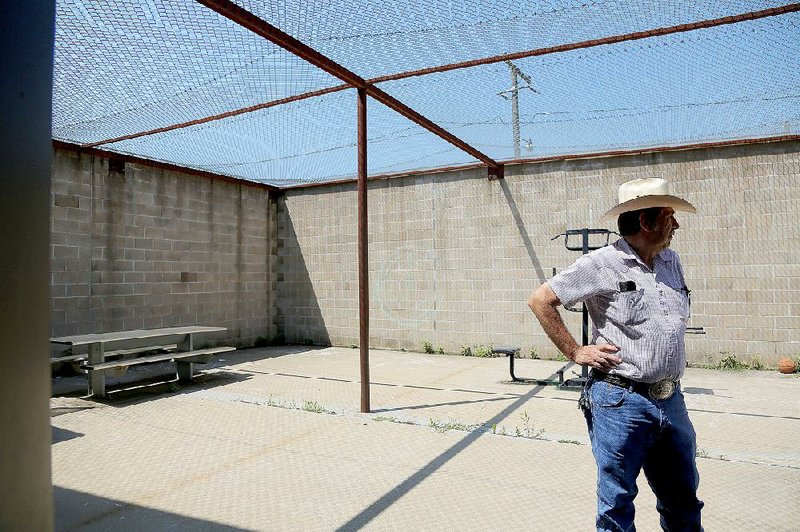DANVILLE -- Mike May walks past locked cell doors at the youth lockup in Danville, and teenage fists slowly pop through square slots.
Each fist gets a bump from May and a question asked in a deep, caring voice, "How're you doing?"
May knows the importance of little things -- and this routine is a small part of what he says has changed the culture of the Yell County Juvenile Detention Center, where the staff once used restraints as punishment and guards pepper-sprayed youths for minor, nonthreatening misbehavior.
Gone is the restraint device known as The Wrap that staff members used in a way that prompted the state Youth Services Division to remove youths from the lockup. The pepper spray is also out. So is a mechanical restraint chair.
May notes that these changes occurred before his hiring as the lockup's administrator in February. But he's made several changes of his own that have resulted in praise from Yell County Sheriff Bill Gilkey, the Youth Services Division, and the staff and youths who work and live at the 24-bed lockup.
Each change revolves around a core belief that May espouses about how to treat youths who have behavioral problems.
The more he can reward youths for good behavior, the better they behave -- and the more privileges he can revoke if someone decides to act out. Physical and mechanical restraints are to be avoided in all but the most extreme of situations, he said.
In the six months since he's been at the lockup, May said, the staff has noticed results.
"Everybody has been pretty receptive to everything we've done," May said. "They've seen the difference in the kids."
Numbers from the Youth Services Division show that there have been only three fights reported at the lockup since May's hiring, compared with about 25 during the same time last year.
Gilkey credits May for much of the improvement at the juvenile detention center.
"I think Mike has done an excellent job. He's made great progress faster than I myself or anybody would have thought," Gilkey said.
Youth Services Division Director Marcus Devine said he's been impressed with what he's hearing from monitors who visit the Yell County lockup.
"The facility is still improving. There is more work yet to do, but I think they've made a good change in their approach. That would be to me the biggest thing. With their new leadership and their desire to work with us, they have been hungry to find out the best ways to do things," Devine said.
Division staff members have been at the facility weekly over the past several months. The division also has trained the lockup's staff on child brain development and verbal techniques to de-escalate confrontations with difficult youths.
April Hannah, the division's internal investigator, also has visited the facility regularly. She said she's noticed a difference in what she's hearing from teens who spend time at the lockup.
"Everyone has been pleased with Yell County. Some of our kids have had the luxury, or not, of being able to compare Yell County to some of the other JDCs in the state, and they're very vocal in that comparison that 'I like this' versus 'I did not like that,'" she said.
One such comparison came earlier this month when Hannah interviewed two teenagers at the Arkansas Juvenile Assessment and Treatment Center near Alexander, the state's largest secure campus.
"Neither of them had anything negative to say. They really did like Mr. May and his staff. And they really felt the staff did a good job of listening to them and treating them fairly," Hannah said.
In interviews over the past few weeks, May stressed the importance of listening and being fair. Every time he interacts with one of the youths, he said he's looking to build a rapport, but he notes that it's taken some time.
May, 61, wears jeans, a short-sleeve, pearl-snap shirt. His belt buckle has some heft to it, and he's rarely without his cowboy hat.
He's a former sheriff, an Army veteran and a former correctional officer. Many of these teens have spent a lot of time running from guys like May.
But May said he and his staff have worked hard to earn the trust of the youths through concrete changes at the facility. First on the list was the food.
His first day on the job, May said, he was too busy to eat lunch. But the second day, he asked one of his staff members what was for lunch. The detention officer gave him a funny look. The officer said he wasn't going to eat what the youths were eating -- TV dinners from the microwave.
May said he immediately had a discussion with the lockup's cook and made a decision.
Now, a cook prepares meals in the lockup's kitchen every weekday, and May eats what they eat, like fried catfish and spaghetti. (The youths eat sandwiches and some frozen dinners on the weekends.)
The portions are tailored to the needs of each child, May said.
"We've got kids who are 6'2" and 240 pounds, and a spoonful ain't good enough," he said.
May said making sure the youths eat well is a key part of addressing their behavior.
"Some of these kids are here because they didn't have anything to eat. They go out there and they steal because they're hungry, and they're caught. And then they go in here, and we're not going to feed them? No way," he said.
Changes to the food were just the beginning. The staff now throws birthday parties for each youth. The youths have regular movie nights. And youths are allowed five photos and five letters in their cells.
"The more you can have from home, that's more you can go to take you away from here," he said. "You have a bad day, you can take your picture and look at your mother, sister, brother -- and you can escape for a little bit," he said.
May also loosened the visitation policy to allow youths' siblings to visit, instead of only parents or guardians. He allows youths who are parents to see their children as long as they're accompanied by an adult family member.
And those youths who don't have family or regular visitors can request to have someone visit them. May has a list of 10 people he can call on at any time to visit with the boys and girls.
W.A. Gorman, pastor of New Life Outreach church in Danville, is one of the on-call visitors. Gorman's church has held weekly church services at the lockup for about 10 years, and when May took the administrator job, Gorman was at the top of his list of volunteer mentors.
Gorman visited with one boy in particular. The boy was in foster care and had been depressed because he didn't have anyone to visit him. May called Gorman, who agreed to become the boy's regular visitor.
"I did go several times there to encourage him and be a friend and be an adult mentor that he could talk to and I could encourage him," Gorman said. "I really believe you have a positive note to start with because you showed that you cared to take time out to visit with them. I think that makes an impression on them."
Since May instituted the program, Gorman said six to 10 members of his church have participated. Other churches have gotten involved as well.
"Everyone that's went has had positive times with young people. It's been good for us. It's good for them. Anytime you give out, you ultimately get more than what you give out," Gorman said.
In addition to the outside visitors, May meets every two weeks with groups of youths.
May said he's learned a lot about the youths from these meetings. Many who are in the Youth Services Division's custody come from across the state, and May said there's a similarity in a lot of their life stories.
Recently, about half of the youths in the lockup had at least one close family member in prison. May said one boy told him that his father was in prison and his mother and sister were addicted to crack cocaine.
"What does he have to look forward to the day he walks out of here? He's going to be right back. We've got to help him some way," he said.
Part of May's plan to help hangs on a wall of his office. Across from photos of his five grandchildren, there are also four other young faces -- two girls and two boys. They each earned their General Educational Development, or GED, diploma while at the lockup.
The photos were taken at parties held in their honor that were attended by the rest of the teenagers at the lockup.
"At each party, I tell the kids, y'all can thank them for this party because they were the ones who worked hard and sacrificed to get this GED," he said.
One of the boys, now at the Arkansas Juvenile Assessment and Treatment Center, was recently accepted into the University of Arkansas Community College at Morrilton, May notes with pride.
May said he's hoping more youths at the facility will continue to pursue their diplomas. One boy expressed interest just a few weeks ago.
And May and Gilkey said they're hoping to add more than GED preparation to the list of things offered by the juvenile detention center.
They want to have vocational training and classes on practical skills such as cooking and gardening, if the classes are cleared through the Youth Services Division and the Arkansas Department of Education.
"When you're dealing with troubled youth, a large percentage of them aren't going to be college material, but I think we can help them find a path to be productive, live an honest life and be somebody that their kids can be proud of and not enter the adult Department of Correction," Gilkey said.
May said he hopes the center can begin to incorporate more vocational classes soon.
"What these kids do with their GEDs, I can't control that, but they're not going back home the way they left there. They're going back with something," May said. "I would love to send them back home with something more than a GED."
SundayMonday on 08/09/2015



